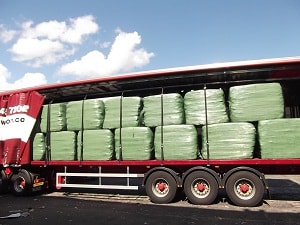Local authority waste management officers have raised concerns about the lack of sufficient energy from waste capacity in the UK.
The concerns come in the wake of Dutch Parliament plans to levy a 32 Euros per tonne tax on municipal waste sent by local authorities to the Netherlands from 1 January 2020 (see letsrecycle.com story).
The officers are members of the Association of Directors of Environment, Economy, Planning & Transport (ADEPT) and they note that the UK lacks sufficient energy from waste capacity for municipal waste.
However, a number of the authorities now concerned about future RDF costs – such as West Sussex – have actually been against construction of energy from waste plants within their boundaries in the past, preferring to send waste for energy recovery outside of their own area.
In a newly-published statement and policy paper, the council officers urge Dutch MPs not to support the idea of a tax, “because it would limit or stop export of the waste in the form of Refuse Derived Fuel from the UK”.
They say: “Our concern is for the following reasons: Any such move would immediately limit or preclude further export of material from our members. The UK lacks sufficient Energy from Waste (EfW) infrastructure to recover energy from all municipal waste generated meaning that in the short and medium term the default option would be landfill.” Other reasons given by ADEPT include the fact that landfill will cost more than RDF.
Landfill
The officers argue that a move to more landfilling would be counterproductive environmentally, in increasing total greenhouse gas emissions. ADEPT states: “Landfill of any organic fraction is significantly more polluting than EfW.”
ADEPT has sent its position paper to the Netherland Parliament’s Vaste Commissie voor Infrastructuur en Waterstaat (Commission for Waste, Public Works and Water Management) ahead of a roundtable meeting on the 1st October 2019.
They write: “We would respectfully call for Members of Parliament to consider the overall impact of this proposal from a transboundary and global perspective and, at the very least, pause the process for a full Environmental and Financial Impact Assessments to be made. If the changes are to go forwards we would urge that longer notice is given so that alternative arrangements can be made which can mitigate these very real impacts.”
CASE STUDY: West Sussex and incineration/RDF
West Sussex is typical of one UK local authority having to export RDF because it did not want an energy from waste plant in its own area. Steve Read, who joined the county two year’s ago is both its director of environment and public protection and the lead officer on RDF exports for the ADEPT Waste Panel.
On the Dutch situation and problems that the tax might cause, Mr Read said: “The underlying issue is the lack of waste disposal capacity in the UK. While market forces – and increased recycling – are expected to continue to correct this over the next few years, export of RDF has provided a solution with a significantly lower carbon impact than landfill also benefitting the Dutch economy and energy supply network.

West Sussex has been against the construction of an energy from waste plant within the county (picture: Shutterstock)
“My own Authority – West Sussex County Council – exports around 90,000 tonnes of RDF a year roughly equally between The Netherlands and Germany. The economics of RDF export over landfill are marginal and we don’t have sufficient UK capacity to switch into domestic energy from waste facilities.”
Last resort
West Sussex county council has been against burning its own municipal waste within the county in an energy from waste plant, partly because of public opposition. In the past the authority declared energy from waste as a “last resort” favouring other treatment options.
The decisions on the county’s policy for the last 15 years have largely followed from statements in 2004. Then Cllr Steve Waight, cabinet member for strategic planning and environment summed up the county’s view. He declared: “I expect incineration to be the last resort. I do not believe that we will see incineration in West Sussex before 2015, and I am asking officers to take this as the guiding objective in devising the strategy for the contract.”
MBT plant
The county council had had the idea of building an energy from waste plant as early as 2003, identifying sites at Warnham Brickworks, Portfield and the former Shoreham Cement Works. But, in the face of public opposition, councillors backed off and instead eventually went on to award a contract to Biffa to operate an MBT plant for residual waste. West Sussex county councillors’ aspirations for the construction of a combined heat and power plant to use fuel from the waste generated by the MBT plant, which would also have heated a new housing estate, came to nothing.
Despite West Sussex’ desire not to have incinerators/energy from waste plants, two are now being suggested independently of the county council and could figure in future contracts.
Options emerging
Commenting on the West Sussex situation, Mr Read told letsrecycle.com that the county would like its waste to be incinerated in the UK but that there is “insufficient infrastructure”. However, while he did not mention the idea of an energy from waste plant directly in West Sussex in the future, future local options could emerge as there are at least two proposals for EfW plants in the county, one from Grundon/Viridor at Ford, West Sussex (gasification) and the other from Britaniacrest for a plant at Horsham.
“West Sussex would prefer for our waste to be dealt with in the UK.”
Mr Read commented: “West Sussex would prefer for our waste to be dealt with in the UK but there is insufficient infrastructure capacity to do it – we tendered a five year contract for RDF offtake under OJEU rules and the winning bid was for export. We welcome the development of RDF UK facilities and would hope they tender when the contract is next renewed.
“The EfW facilities which take our waste in Germany and Holland are CHP plants which generate heat as well as electricity and are consequently far more efficient than most of the UK EfW infrastructure. This more than compensates for the transport costs involved when comparing total system impacts.”
The post Council officers raise concerns over EfW capacity appeared first on letsrecycle.com.
Source: letsrecycle.com Waste Managment



